Marchés
Lors de la conception d’une intervention humanitaire et de la prise de décisions quant à l’utilisation des transferts monétaires, l’analyse générale des options de réponse doit inclure une analyse de marché. Il est prouvé qu’offrir un soutien ciblant le fonctionnement des marchés accélère la reprise et accroît la résilience dans les zones affectées par une catastrophe.
De nombreuses organisations ont investi dans la mise au point d’outils visant à faciliter l’analyse de marché et réfléchissent à la mise en place de programmes basés sur les marchés plus holistiques. Elles envisagent des interventions tirant profit du marché (basées notamment sur des transferts monétaires aux populations affectées), ainsi que des interventions soutenant directement les marchés (comme l’octroi de subventions conditionnelles aux vendeurs/euses pour la remise en condition du marché).
Initiatives associées
Contenu associé

1.2 Introduction à l’analyse de marché
Cours
Ce cours de 30 minutes offre une introduction à l’analyse de marché pour les contextes d’urgence. Il contient des contributions d'experts dans ce domaine. Ce cours a été développé en collaboration avec l'International Rescue Committee et le CALP Network et grâce au financement d’USAID/OFDA et de l’Agence Suisse pour le Développement et la Coopération. Il est destiné aux...

2.4 Un guide pratique pour l’analyse de marché
Cours
Ce cours en ligne de 3.5 heures vise à fournir aux équipes qui conduiront des analyses de marchés en contextes humanitaires une compréhension approfondie de la théorie et des étapes à suivre afin de leur permettre de comprendre le pourquoi et le comment du processus à suivre. Les participants seront guides à travers un scenario d'analyse de marchés d'urgence. Ce cours s'appuie sur...
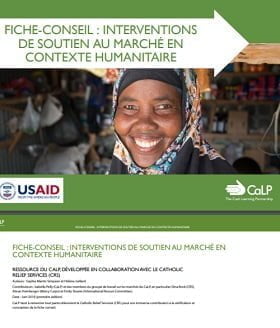
Fiche-Conseil : Interventions de soutien au marché en contexte humanitaire
Guides et outils
La fiche conseil définit le programme de soutien au marché en contexte humanitaire et le décrit dans la pratique. Elle permet aux praticiens humanitaires d’envisager systématiquement des interventions de soutien au marché, parallèlement à d’autres activités du programme. Le champ d’application comprend des interventions de soutien au marché axées sur l’offre/la disponibilité...
Thematic lead
Latest

Compte-rendu du Cash Working Group du Tchad du 29 juin 2017
Rapport
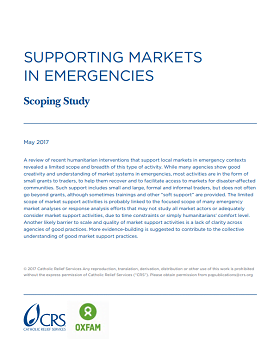
Supporting markets in emergencies. Scoping study
Report
A review of recent humanitarian interventions that support local markets in emergency contexts revealed a limited scope and breadth of this type of activity. While many agencies show good creativity and understanding of market systems in emergencies, most activities are in the form of small grants to...

Early Lessons Learnt from Cash Transfer Interventions in Post Matthew Haiti
Report
This technical report has twofold purposes, firstly to describe the main international evidence on cash transfer programing pertinent for the Haitian post Matthew emergency context; and secondly, to document the main lessons that can be learnt from the UNDP post Matthew cash transfer intervention. The...

Cash Consortium of Iraq (CCI)
Report
The Cash Consortium Iraq (CCI) was selected as a case study to illustrate a consortium model of inter-agency collaboration for multi-purpose cash assistance (MPCA), with a formal relationship between partners and a shared funding stream, both bilaterally to member agencies and through the lead agency. It...

Cash and Markets Monthly Dashboard DRAFT April 2017
Guidelines and Tools
• The cash and markets, monthly dashboard presents current data on market prices of key commodities and the cost of the minimum expenditure basked (MEB) across Somalia. In addition, it also provides key highlights relevant to cash and market interventions.
• Page one presents the cost of the food MEB...
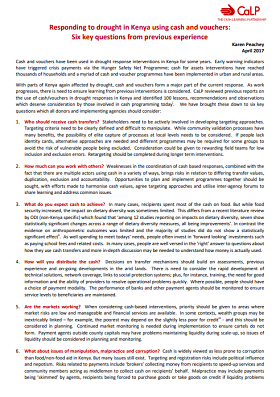
Responding to Drought in Kenya Using Cash and Vouchers: Six Key Questions from Previous Experience
Guidelines and Tools
the CALP Network reviewed previous reports on the use of cash/vouchers in drought responses in Kenya and identified 100 lessons, recommendations and observations which deserve consideration by those involved in cash programming today. We have brought these down to six key questions which all donors and...
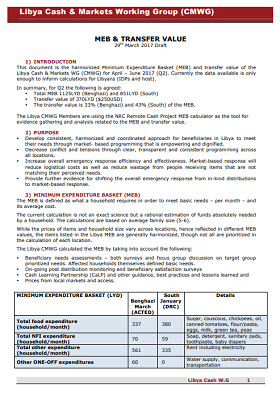
MEB and Transfer Value Guide
Guidelines and Tools
This document is the harmonized Minimum Expenditure Basket (MEB) and transfer value of the Libya Cash & Markets WG (CMWG) for April – June 2017 (Q2). Currently the data available is only enough to inform calculations for Libyans (IDPs and host).
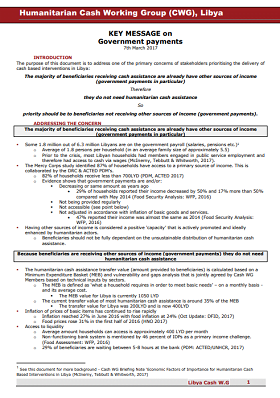
Libya Humanitarian Cash Working Group (CWG) Key Messages on Government Payments
Report
The purpose of this document is to address one of the primary concerns of stakeholders prioritising the delivery of cash based interventions in Libya:
The majority of beneficiaries receiving cash assistance are already have other sources of income (government payments in particular) Therefore they do not...
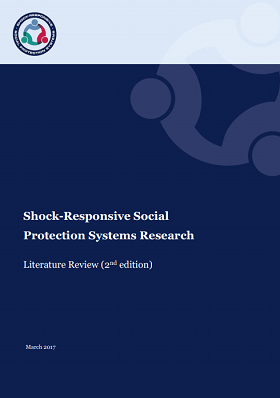
Shock-Responsive Social Protection Systems Research: Literature Review (2nd Edition)
Report
DFID has commissioned research into Shock-Responsive Social Protection systems, to further understand the nature of the interaction between social protection, humanitarian and disaster risk management systems and ways in which long-term social protection systems can be scaled up to provide support in...
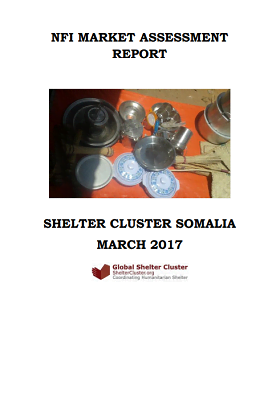
NFI Market Assessment Report – Somalia
Report
The Shelter Cluster, through its regional coordinators rolled out NFI market assessments in six towns including Mogadishu, Kismayo, Bossaso, Baidoa and Dobley through a rapid mobile technology based market survey tool. The purpose of the survey was to establish where NFI markets exist and what items are...

Geneva based Cash Working Group – Minutes – February 2017
Report
Geneva based Cash Working Group – Minutes – February 2017
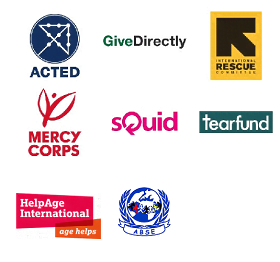
Press Release: Providing cash directly to those most in need is revolutionising the way we provide overseas aid to the world’s poorest people
Blog Post
London, United Kingdom – As the global partnership for cash transfer programming in humanitarian aid, the the CALP Network takes issue with recent criticisms of cash transfers made by Nigel Evans MP and in the media. Cash transfer programming is one of the most highly scrutinized forms of aid. The CALP...

Can E-Transfers Promote Financial Inclusion in Emergencies: A Case Study from Ethiopia
Report
The Electronic Cash Transfer Learning Action Network (ELAN) launched this research to build an evidence base around connecting emergency electronic transfer (e-transfer) recipients with additional financial
services. They also wanted to learn if, when, and how e-transfers can promote sustained uptake and...

Collecting Prices for Food Security Programming
Guidelines and Tools
As a contribution towards standardizing price data collection, this paper aims to explore the core issues related to setting up a price monitoring system, also in countries where no such system currently exists. It describes the factors a country office needs to consider when designing such a system,...
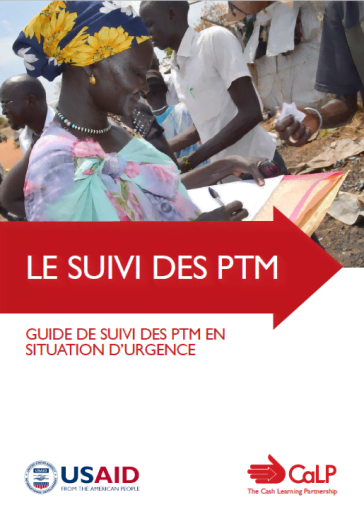
Le suivi des PTM : Guide de suivi des PTM en situation d’urgence
Guides et outils
Ce guide constitue une ressource centrale « évolutive « pour promouvoir une compréhension commune des considérations de suivi les plus importantes pour les projets humanitaires utilisant des programmes de transfert monétaire (PTM).
L’objectif du présent guide est d’aider les praticiens sur le...

Profiling of caseload in need of cash-based interventions Results
Report
At the request of the Inter Sector Working Group in Gaziantep, the Case Management Task Force and the Protection Working Group, the Cash-Based Interventions Technical Working Group (CBI TWG) produced this “Cash Gap Analysis”. The analysis aimed to profile the refugee population in Turkey who require...

Karamoja Market Assessment
Report
A market assessment of the feasibility of cash transfers in the Karamoja region – Executive summary
The effect of financial aid from UK Aid Girls’ Education South Sudan programme and EU IMPACT programme to education in South Sudan in 2017
Report
This paper is an update to the previous Girls’ Education South Sudan working paper that looked at the effect of financial interventions (capitation grants and girl’s cash transfers) by Girls’ Education South Sudan, a collaboration of UK Aid and the Ministry of General Education and Instruction,...
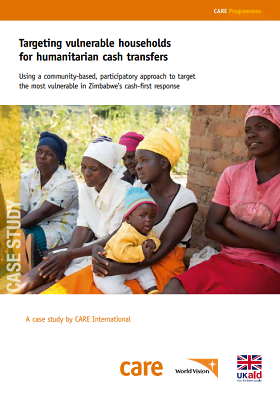
Targeting vulnerable households for humanitarian cash transfers: using a community based, participatory approach to target the most vulnerable in Zimbabwe’s cash-first response
Report
Over 73,000 drought affected households across 15 districts in Zimbabwe received monthly multi-purpose, unconditional cash transfers. With such a large caseload over a wide area, 100% verification of the households would not have been the most resource efficient approach. Moreover, there would have been a...

Exploitation des technologies numériques dans les transferts monétaires mis en oeuvre lors de la réponse à l’épidémie d’Ebola
Rapport
L’adoption des technologies numériques s’est accrue parallèlement à l’essor des transferts monétaires, souvent au moyen de transferts électroniques, car ces solutions présentent des avantages en matière de transparence et d’efficacité (gain de temps et d’argent). En 2015, le Haut Panel...
